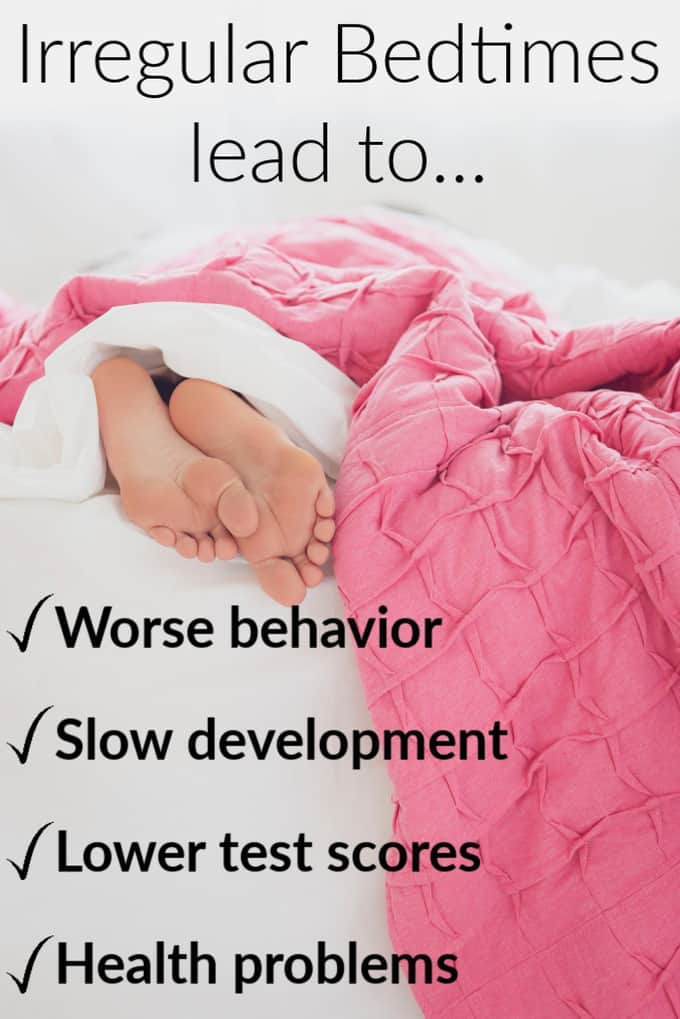This post may contain affiliate links. Please read our disclosure policy.
This post has been updated with new studies proving what we already knew… Irregular Bedtimes for children (and adults) lead to worse behavior, slower development, and health issues. Consistent routines & regular bedtimes for kids and adults are extremely important.
Even going to bed at 8:00 one night and 9:00 the next night is a mistake, according to the latest reports. This means a one-hour difference each night makes a significant difference.
(Maybe this is why Dutch children sleep longer)

Increased Risk of Heart Disease
Having an irregular bedtime for child(ren) can impact more than just their health. According to the A. Pawlowski, a contributor of the TODAY show…
“Having an irregular bedtime routine and getting different amounts of sleep from night to night was linked to higher chances of having metabolic syndrome, which raises a person’s risk for heart disease, a new study published in Diabetes Care has found.
That means caution for people who might go to bed at 10 p.m. one night and 2 a.m. the next, for example. Or those who get seven hours of sleep one night and ten hours the next.
Every one-hour increase in the variability of how long a person sleeps from night to night was associated with 27% higher odds of metabolic syndrome, and every one-hour increase in the variability of bedtime was associated with 23% higher odds, researchers said.”
This means that while most adults know that they should go to bed at the same time each night, it is becoming more and more apparent that children need to do the same.
Is there proof that a child’s bedtime impacts their behavior? Yes.
Yes! British researchers conducted a study of 7-year-olds and found that more than 50% of 7-year-olds went to bed regularly between 7.30 and 8.30 p.m.
The study looked further to find the differences between those children with regular bedtimes and those who went to bed at different times each night. They asked the mothers and teachers of these children if they saw a difference between the children, as well.
They found that irregular bedtime for children has a BIG impact on behavior. Young children who don’t have a regular bedtime behave far worse than those who sleep at the same time each night.

Irregular Bedtime Causes Emotional and Social Issues, too.
“Researchers studied data on more than 11,000 seven-year-olds, whose parents had been questioned about their family routines when the children were aged three, five and seven.” – Telegraph.
The conclusion was that both mothers and teachers found that the group of children with irregular bedtimes were more hyperactive than their well-rested peers. They were also found to have behavior and conduct problems. These children had emotional issues and social problems, as well.
According to an article published in 2013 on Medical News Today: Parents, teachers, and doctors all agree that lack of sleep makes children cranky, tearful, and more prone to tantrums. They are more likely to have behavioral difficulties.
“Children with nonregular bedtimes had more behavioral difficulties. There was an incremental worsening in behavioral scores as exposure through early childhood to not having regular bedtimes increase.” – Academy of Pediatrics.
Another study published in Pediatrics found that irregular bedtimes could disrupt natural body rhythms and cause sleep deprivation, undermining brain maturation and the ability to regulate certain behaviors.
The results of these studies “revealed that behavior grew worse the more years a child spent without a firm bedtime.
“Irregular bedtimes affected children’s behavior by disrupting circadian rhythms (body clock), leading to sleep deprivation that affects the developing brain.” – lifescience.com
In the Journal of Epidemiology and Community Health, the researchers explained that sleep is “the investment needed to allow learning fresh the next day.

Inconsistent Bedtimes = Lower Test Scores
Irregular bedtime affects the developing brain. Children were given reading, maths, and spatial awareness tests at three years of age and again at seven. The goal was to determine whether their bedtime impacted their scores and whether the effects built up or disappeared over time.
The results showed that children who did not have a regular bedtime at the age of three went on to score lower in all three tests by the age of seven, suggesting it could be a critical period in their development.”

Irregular bedtimes are similar to the effects of jet lag for children.
According to TIME magazine, “Such irregular bedtimes, the scientists say, are similar to the effects of jet lag on children.
Going to bed at different times every night can disrupt the youngsters’ circadian rhythms, establishing sleep-wake patterns, and resulting in sleep deprivation. And just as adults who lose sleep suffer from its effects, so do young children.”
“We know that early child development has profound influences on health and well-being across the life course. It follows that disruptions to sleep, especially if they occur at key times in development, could have important lifelong impacts on health,” said Yvonne Kelly, Department of Epidemiology & Public Health at University College London.
While previous work documented the increasing amount of disrupted sleep among older kids, who are distracted by computers, social media, and video games well into the night, the current study documented that inconsistent sleep times can harm children’s development even at an early age.
The researchers found that the effects of poor sleep built incrementally as kids aged.
Irregular bedtimes can impact their weight and self-esteem.
Children with irregular bedtimes were more likely to be overweight. They are also likelier to have lower self-esteem than others with a consistent bedtime. It was found that children who did not have breakfast and children who had irregular bedtimes were more likely to be overweight and obese by age eleven.
Children with a mostly-regular bedtime (for example, when children have different bedtimes on the weekend compared to the weeknights) were 20% more likely to be obese or overweight than those with a consistent bedtime.
Creating Routines Contribute to Regular Bedtimes
- Creating a Habit: Repeating the same activities every night helps establish a strong sleep habit, making it easier for kids to settle down at the same time each night.
- Cueing Sleepiness: Activities like reading or bathing signal the brain to release sleep-inducing hormones, helping children become sleepy naturally.
- Regulating Circadian Rhythms: Consistent bedtimes and pre-sleep activities align with the body’s natural clock, leading to better sleep patterns.
- Strengthening Parent-Child Bonds: Bedtime is an opportunity for talking & closeness, making children more likely to look forward to and cooperate with the bedtime routine.
The Good News? Effects are Reversible
“Reduced or disrupted sleep, especially if it occurs at key times in [their childhood] development, could have important impacts on health throughout life.” ~Telegraph
There is good news! “A 2013 study from University College London found that children with non-regular bedtimes had more behavioral difficulties, but interestingly, the study also suggests that the effects of these irregular bedtimes are reversible. By establishing a routine, parents can help their children ‘reset’ their internal clocks—mitigating the negative impacts of sleep inconsistency.”
The GOOD NEWS is that children’s behavior improved significantly when they switched to a scheduled bedtime.
You Can Reverse the Effects!
Much like how routine adjustments can help travelers overcome jet lag, scheduled (regular) bedtimes can help to reverse the effects of previous inconsistent bedtimes.
Enforcing these regular bedtimes during early childhood will have a significant influence on children’s behavior. Their behavior, physical and mental health, and emotional/social health will all improve.
It is one of the reasons that we are so strict about our kids’ bedtime.

EVEN BETTER NEWS… If your child has had inconsistent bedtimes up to this point, adding a consistent regular bedtime will help them greatly! The children who picked up regular bedtimes showed great improvements in their behavior and test scores.
How to Begin Reversing the Effects:
- Talk to your children and pick a bedtime that is consistent.
- Pick a bedtime that is consistent every night.
- Explain the reasoning behind their new bedtime that is the same during the week as on the weekends, and then jump right into the new schedule.
- Be Consistent. Try to stick to the new bedtime as much as possible.
- Create Routines (like the bedtime conversation cards or use the Routine Charts to help)
Good luck!
HELPFUL YOU MIGHT LIKE:
Our son’s sleep disorder was misdiagnosed as ADHD & a behavior problem
















Becky this is news to my ears . I am so glad we kept to the same bedtime with our little one. I can vouch for your article as we never encountered any issues and no problems with development ever.
That’s great to hear 🙂
This is why my kids always had a bed time and getting up time. This is why I still go to bed at 9pm and get up at 4am every day. No sleeping in …no staying up late….It is also to have a routine eating habit. Three meals per day and small snacks every 2 hours. No need to diet,,, if you eat good food and stay in a routine. It works.
It makes a significant difference!
We have seen it in all 11 children we’ve had placed with us through foster care.
Establishing the bedtime routine and assuring they were getting enough sleep significantly decreased their anxiety, behaviors at home and school and made doing homework easier.
And when there was a neurological issue such as ADHD, we accepted the doctors advice and utilized sleep aids (2 of our children). One had a prescription sleep aid and other- again under doctor care- we utilized melatonin.
oh! I can understand why my child behave worse. Thanks for your guidance.
I am SO glad to see this post! I have always been such a big stickler about bedtime and routine in general. People think I am just uptight but you can see such a difference in my child when his routine slips! Great topic and fantastic post!
Thank you so much for your sweet response! I totally agree with you – I’ve definitely been told I’m uptight, but we know our own kids best!
Maybe b/c we homeschooled and had no specific wake-up time until high school, when they started classroom school and needed to catch the bus at 0630, we never had any issues……. (and we lived to tell the tale, the kids are now grown up, with good jobs, one an attorney/JD the other a scientist with PhD in molecular biology…)